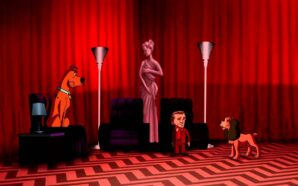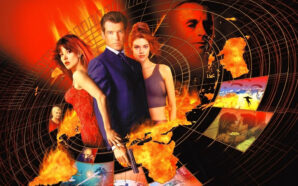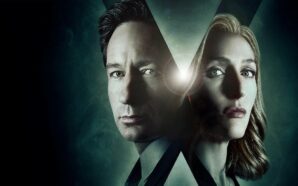Time, the fire in which we burn, has flown by and we’re now halfway through the first season of Star Trek: Picard. The series offers our first glimpse at Jean-Luc – or JL – since the TNG movies came to an underwhelming end with Star Trek: Nemesis 18 years ago, and it’s a very different version of that character who grumpily greets us on the grounds of his French château. The galactic landscape has drastically changed as we see Picard face his failures surrounding the destruction of Romulus and seek out the ‘daughter’ of his beloved android friend Data, before both storylines threaten to converge and reveal a galaxy-shaking secret. I thought the show got off to a strong start in its premiere episode – which you can read my thoughts on here – but have the following episodes followed suit? Let’s discuss episodes two through five of Star Trek: Picard’s debut season.
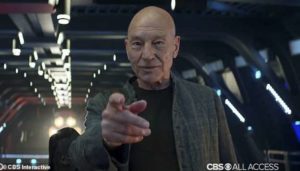 After a good opening episode that reintroduced Picard and set up the driving force of the plot, the series immediately took a downwards step. Well, maybe not immediately because I think the opening scene of the second episode showing us the synth attack on Mars is very effective, but straight after that we get two largely messy episodes. It’s not until the end of the third episode that Picard utters his famous word “engage”, heading out on his mission, but I don’t think that’s a problem. There’s plenty to explore down on Earth and we get to witness a more resigned Picard slowly inch towards the assertive character we know him to be. There’s also plenty of plot – often too much – to explain before the show can really get moving and it’s the execution of this exposition that drags these episodes down.
After a good opening episode that reintroduced Picard and set up the driving force of the plot, the series immediately took a downwards step. Well, maybe not immediately because I think the opening scene of the second episode showing us the synth attack on Mars is very effective, but straight after that we get two largely messy episodes. It’s not until the end of the third episode that Picard utters his famous word “engage”, heading out on his mission, but I don’t think that’s a problem. There’s plenty to explore down on Earth and we get to witness a more resigned Picard slowly inch towards the assertive character we know him to be. There’s also plenty of plot – often too much – to explain before the show can really get moving and it’s the execution of this exposition that drags these episodes down.
Laris and Zhaban just explaining what the Zhat Vash is to Picard and the Romulan infiltration of Starfleet in which characters speak in riddles for mystery’s sake are sequences that take up too much time and are very clumsily written. Zack Handlen summed it up well in his review for The AV Club where he described the plot as simultaneously under-baked and over-explained, an issue that also plagues Star Trek: Discovery. These two episodes were originally designed to be only one until the creatives decided to expand this section of the season and dump information that we would have found out later in the season much earlier, and it shows. The episodes pelt an awful lot of exposition at you and introduces probably too many characters, at the detriment of Picard and his personal journey.
 But when Picard is onscreen, I’m really enjoying the show. I said it in my premiere review and I’ll say it again here, Patrick Stewart is incredible in this series and his performance elevates the writing dramatically. While I have criticisms of the second and third episodes, and felt somewhat disappointed by them, I think they contain my two favourite scenes of the series to date. The first is Picard meeting with his old friend and former doctor aboard the Stargazer, in which we see Picard at his softest as he learns of his terminal diagnosis. The show has tried to present Picard’s deep relationships with characters we’ve never been introduced to before a couple of times so far, Raffi being the most prominent, but it’s with Dr Benayoun where the series is most successful with this difficult task. I truly buy that these two characters are old friends but also that Benayoun served under Picard, and I’m very happy they expanded the lore and introduced someone from the Stargazer rather than use Dr Crusher so early in the show.
But when Picard is onscreen, I’m really enjoying the show. I said it in my premiere review and I’ll say it again here, Patrick Stewart is incredible in this series and his performance elevates the writing dramatically. While I have criticisms of the second and third episodes, and felt somewhat disappointed by them, I think they contain my two favourite scenes of the series to date. The first is Picard meeting with his old friend and former doctor aboard the Stargazer, in which we see Picard at his softest as he learns of his terminal diagnosis. The show has tried to present Picard’s deep relationships with characters we’ve never been introduced to before a couple of times so far, Raffi being the most prominent, but it’s with Dr Benayoun where the series is most successful with this difficult task. I truly buy that these two characters are old friends but also that Benayoun served under Picard, and I’m very happy they expanded the lore and introduced someone from the Stargazer rather than use Dr Crusher so early in the show.
My second favourite scene is that of Picard visiting Rios for the first time on the La Sirena. He’s finally back on the deck of a starship and Picard begins to feel more like his old self, saying goodbye to his more passive nature from the previous episodes and hello to the more authoritative Picard of old as he begins his first adventure in 14 years. This continues in later episodes too; his loud and curt “come” when allowing Raffi to enter the holodeck in the fourth episode sent shivers down my spine. I’m not sure how much of this change in Picard is intentional from the writing or whether it’s born from Stewart’s acting, but it’s a highlight of the show.
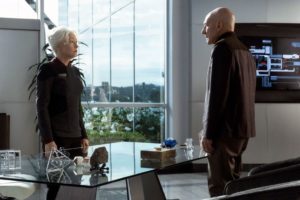 The second episode featured the scene I’m probably the most conflicted about: Picard’s meeting with Admiral Clancy. The scene achieves what it sets out to do but it could have done so much more. Clancy is angry with Picard; Picard is angry with Clancy – the personification of this new Starfleet – and they leave without an agreement leaving Picard to have to gather his own crew and ship. The scene gives us everything we need to further the plot and comment on the relationship between Picard and his former beloved institution. But did it really have to become a shouting match so soon? There is reason for this with the recent interview Picard was involved with. Clancy is angry from the outset because the interview and so it does track, but wouldn’t it be more interesting for them to begin with a civil conversation about their philosophical differences in which the anger builds over a lengthy scene rather than the sudden outburst we get?
The second episode featured the scene I’m probably the most conflicted about: Picard’s meeting with Admiral Clancy. The scene achieves what it sets out to do but it could have done so much more. Clancy is angry with Picard; Picard is angry with Clancy – the personification of this new Starfleet – and they leave without an agreement leaving Picard to have to gather his own crew and ship. The scene gives us everything we need to further the plot and comment on the relationship between Picard and his former beloved institution. But did it really have to become a shouting match so soon? There is reason for this with the recent interview Picard was involved with. Clancy is angry from the outset because the interview and so it does track, but wouldn’t it be more interesting for them to begin with a civil conversation about their philosophical differences in which the anger builds over a lengthy scene rather than the sudden outburst we get?
What’s potentially interesting about this conversation is that neither side are wholly right or wrong. They both have valid points to make. Starfleet lost their main shipyards and many, many people in an attack that essentially destroyed a planet (Mars is still burning) and decided to focus on that internal matter instead of offering aid to a race also in danger of planetary destruction. And, as Clancy points out with an awkward F-bomb, Picard is being arrogant to think he can just stroll in and take command of a ship again. But we’re made to side with Picard’s view of the old utopian Starfleet ideals not because of discussion but because Clancy shouts at an old man and we feel sorry for him. It feels cheap and the scene is a real missed opportunity.
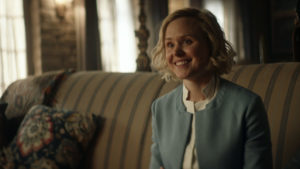 While, as the title suggests, the series is very Picard-centric, we are also introduced to a bevvy of side characters who make up Star Trek’s latest crew. And, for the most part, I like them and support the decision to use new characters rather than just rely on Picard’s old crew mates from The Next Generation. Laris and Zhaban are fun characters as Picard’s ex-Tal Shiar housekeepers and Alison Pill is quite wonderful as Agnes Jurati, although the question of whether or not she’s a spy sours some of her scenes. After we didn’t get to see her meeting with the villainous Commodore Oh and then her sudden appearance at the vineyard at just the right time, it was clear Jurati was hiding something, although I never would have guessed that she’d kill Maddox just two episodes later. I enjoy her bubbly personality and humour so her heel turn worries me, but I am interested in where this is all heading, especially with the EMH knowing of her crime. My only issue is that to turn Agnes to their cause, the Zhat Vash seemingly told her this mind-breaking secret. Really? This huge secret that the entire plot is hinged on and Zhat Vash are willing to kill for and they just told a random person in the hope she’d join their cause?
While, as the title suggests, the series is very Picard-centric, we are also introduced to a bevvy of side characters who make up Star Trek’s latest crew. And, for the most part, I like them and support the decision to use new characters rather than just rely on Picard’s old crew mates from The Next Generation. Laris and Zhaban are fun characters as Picard’s ex-Tal Shiar housekeepers and Alison Pill is quite wonderful as Agnes Jurati, although the question of whether or not she’s a spy sours some of her scenes. After we didn’t get to see her meeting with the villainous Commodore Oh and then her sudden appearance at the vineyard at just the right time, it was clear Jurati was hiding something, although I never would have guessed that she’d kill Maddox just two episodes later. I enjoy her bubbly personality and humour so her heel turn worries me, but I am interested in where this is all heading, especially with the EMH knowing of her crime. My only issue is that to turn Agnes to their cause, the Zhat Vash seemingly told her this mind-breaking secret. Really? This huge secret that the entire plot is hinged on and Zhat Vash are willing to kill for and they just told a random person in the hope she’d join their cause?
And then there’s Raffi. She’s okay but maybe a little too grumpy and antagonistic towards Picard, especially with her opinion of him changing so rapidly in that flashback that begins the third episode. She has resentment seemingly over the difference between her and Picard in terms of money and class, something previously denied to exist on Roddenberry’s utopia of Earth. I’d be fine with this if they actually explored it but it’s only one line and does stick out like a sore thumb. Although I am interested in the housing situation of late 24th century Earth, as boring as that may sound. Picard lives in a Château because he inherited it but if Raffi doesn’t have some large ancient estate passed down in her family it makes sense that she can’t live in one, right? Even in a future without money, you can’t just point at a house and say I want to live there. There has to be a housing market. But I’m getting side-tracked. As a quick way to present Raffi as someone who knows Picard, and yet their relationship is unknown to the audience, she calls him “JL”. Initially I wasn’t a fan of this but I’m coming around to it, or at least I’m just getting used to it. However, I think the scene in the fifth episode in which she visits her son on Freecloud, where we discover the true extent of her past drug addiction and conspiracy theories, was really terrible. The acting, the writing, everything. I was surprised at how bad that scene was. Raffi is my least favourite of the crew so far and I hope that now she’s on the La Sirena for the same reasons as Picard that she’ll improve.
 Rios is a bit more of a cliché character maybe more fitting for Star Wars than Star Trek, but over just a few episodes I’ve come to really enjoy him. He seems like more of a regular working guy rather than the stuffy officers we’ve seen previously in the franchise, although that does still exist somewhere inside of him. His holograms are a neat idea too, once you get past the terrible accents. Whether they’re motivated by self-loathing or narcissism, they’re a lot of fun. Although I am half expecting a hologram of Rios to turn up in blackface with an offensive generic African accent in a future episode. I mean, how many holograms does he have? Or I guess the more important question is how many more accents will Santiago Cabrera butcher? Bring on the Australian chef hologram!
Rios is a bit more of a cliché character maybe more fitting for Star Wars than Star Trek, but over just a few episodes I’ve come to really enjoy him. He seems like more of a regular working guy rather than the stuffy officers we’ve seen previously in the franchise, although that does still exist somewhere inside of him. His holograms are a neat idea too, once you get past the terrible accents. Whether they’re motivated by self-loathing or narcissism, they’re a lot of fun. Although I am half expecting a hologram of Rios to turn up in blackface with an offensive generic African accent in a future episode. I mean, how many holograms does he have? Or I guess the more important question is how many more accents will Santiago Cabrera butcher? Bring on the Australian chef hologram!
While Picard is out on his own odyssey through a radically changed galaxy, we’re treated to an ongoing subplot aboard a derelict Borg cube, the site of research projects run by the Romulans. I’ve become less interested in the goings on aboard the cube episode-by-episode and my patience is wearing thin. I enjoyed it in the second episode as we were granted our first look at these modern Borg and the intrigue behind the purpose of the project, but since then the storyline seems to be stalling. Although, it is cool to see Hugh again. He’s a TNG character who makes sense to appear in this capacity and who previously barely had any personality or characterisation so the writers can pretty much use him to fill whatever purpose they have. I’m invested in Soji just enough at this point because of how much I enjoyed the scenes between Dahj and Picard in the first episode but the longer the two characters stay apart, the more my enjoyment wanes. And Soji being “the destroyer” is a complication to the plot that feels unnecessary, but I’ll wait and see what that actually means.
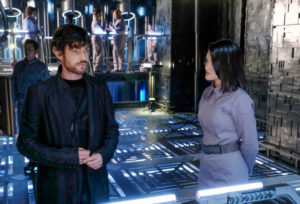 Narek is a character I can’t quite get a grip on and I don’t know how much of that is by design. Sure, he’s a spy so we don’t know what he’s thinking or how much of his affection for Soji is genuine, but I can’t work out whether I should know more than I do at this point. Are we supposed to be questioning his actions at this point? Are we supposed to think he is actually falling in love with Soji, or are we supposed to be accepting that he’s purely focused on the mission only for there to be a twist and he saves her from his sister in a later episode? I don’t know how much I should know or be questioning at this point, and not in a good way. I’m not sure what the writer intends for me to think at the moment. This is the same with Commodore Oh. Are we supposed to presume she’s a Vulcan at the moment or should we know she’s actually a Romulan in disguise, if indeed she is? Narek’s incestuously-charged scenes with his sister are also unnecessary, particularly because they’ve had pretty much the same discussion three times in three episodes. And I know the scene in which Narek and Soji slide down the corridor in socks – like a seven-year-old at a school disco – has been berated for being cringy but I quite liked it as a charmingly silly scene.
Narek is a character I can’t quite get a grip on and I don’t know how much of that is by design. Sure, he’s a spy so we don’t know what he’s thinking or how much of his affection for Soji is genuine, but I can’t work out whether I should know more than I do at this point. Are we supposed to be questioning his actions at this point? Are we supposed to think he is actually falling in love with Soji, or are we supposed to be accepting that he’s purely focused on the mission only for there to be a twist and he saves her from his sister in a later episode? I don’t know how much I should know or be questioning at this point, and not in a good way. I’m not sure what the writer intends for me to think at the moment. This is the same with Commodore Oh. Are we supposed to presume she’s a Vulcan at the moment or should we know she’s actually a Romulan in disguise, if indeed she is? Narek’s incestuously-charged scenes with his sister are also unnecessary, particularly because they’ve had pretty much the same discussion three times in three episodes. And I know the scene in which Narek and Soji slide down the corridor in socks – like a seven-year-old at a school disco – has been berated for being cringy but I quite liked it as a charmingly silly scene.
So, let’s look at this whole ‘Soji is “the destroyer”’ thing. In a way it represents my main issue with the show, and the current incarnation of the franchise, so far: scale. I feel the show should be keeping everything personal to Picard but, like some of the Kelvin movies and Discovery, the stakes are needlessly huge. So, Soji is the prophesied destroyer of the galaxy? That takes away from the personal journey of Picard and her dealing with her own synthetic nature. It’s unrelatable and uninteresting; an unnecessary complication. The stakes should be more personal. I don’t know, maybe they will turn out to be both galactic in nature and personal to Picard and Soji but I fear they won’t be. And an apocalyptic prophecy from Romulan myth? I hope that doesn’t mean another convoluted time travel plot.
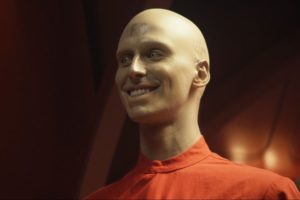 The problem with scale continues with Zhat Vash, the new secret Romulan anti-AI assassination squad. I’m open to adding new lore, which I’ll get to later, but this feels a little too much like rewriting what we already know. I’ll reserve judgement on Zhat Vash until we know all the answers but at the moment, I’m not liking them. Romulans are anti-synthetic? Okay, I’m fine with that. But Zhat Vash have existed for thousands of years? So, since before the Romulans left Vulcan? Why not have them exist for only a few years, with their hatred for androids coming from the fact synthetics destroyed the armada built to rescue them? That’s a perfect motivation that makes sense with the status quo of the galaxy at this point rather than some nebulous prophecy. Everything has to be as big and as shocking as possible in modern Star Trek. Zhat Vash have to have existed for thousands of years to give them artificial weight instead of following what makes sense and keeping everything personal to the guy in the title: Picard. It’d be better just to keep things simple. But as I say, I’ll reserve full judgement for when the answers come. The writers are just making it hard for themselves, and I’m sure Zhat Vash were probably involved in the Mars attack. If theories are to be believed, they may have even created the Borg, or all Romulans are actually synthetic themselves.
The problem with scale continues with Zhat Vash, the new secret Romulan anti-AI assassination squad. I’m open to adding new lore, which I’ll get to later, but this feels a little too much like rewriting what we already know. I’ll reserve judgement on Zhat Vash until we know all the answers but at the moment, I’m not liking them. Romulans are anti-synthetic? Okay, I’m fine with that. But Zhat Vash have existed for thousands of years? So, since before the Romulans left Vulcan? Why not have them exist for only a few years, with their hatred for androids coming from the fact synthetics destroyed the armada built to rescue them? That’s a perfect motivation that makes sense with the status quo of the galaxy at this point rather than some nebulous prophecy. Everything has to be as big and as shocking as possible in modern Star Trek. Zhat Vash have to have existed for thousands of years to give them artificial weight instead of following what makes sense and keeping everything personal to the guy in the title: Picard. It’d be better just to keep things simple. But as I say, I’ll reserve full judgement for when the answers come. The writers are just making it hard for themselves, and I’m sure Zhat Vash were probably involved in the Mars attack. If theories are to be believed, they may have even created the Borg, or all Romulans are actually synthetic themselves.
Opposite to Zhat Vash, the new Romulan lore I do like is what we get in the fourth episode, which I feel is by far the best episode yet. From the previous shows and films, we know Romulans as a very secretive and insular race but they’re no longer in a position to be like that. Their planet has been destroyed, along with most of their race it would seem, and so they can no longer hide behind the neutral zone. Their society is laid bare and this gives us the perfect excuse to explore their culture like never before, along with Picard and the rest of the galaxy. In short, I loved spending time at the Romulan colony in the fourth episode. The episode felt like an instalment of modern Star Trek, from things as little as beaming down to some new planet, to having a welcome thematic underpinning of promises being a prison and Picard trying to put things right before his inevitable death.
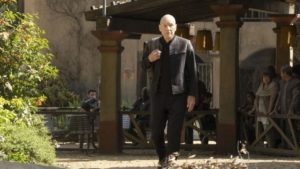 Romulan warrior nuns who believe in “absolute candor”, essentially making them the opposite of both the secretive Romulans we’ve previously seen and the Vulcan logic and emotional suppression the race once fled from, on paper sounds very silly. But I thought the Qowat Milat were fascinating and a great addition to the canon, while also quite literally laying down some harsh truths that Picard needed to hear. Just like Starfleet, the colony has turned isolationist and while for a time Picard was a saint to them, he’s now a villainous figure who divided the race and broke his promises. Seeing Picard have to accept his failure before he continues his mission really brings forth the redemptive theme of his journey. He may not have lost his convictions but he didn’t enforce them as he should have. He let perfection be the enemy of good, essentially giving up on helping these people in their time of need. A mistake he won’t make with Soji. Picard also picks up a new companion in Elnor, or ‘Romulegolas’ as he should be called. I enjoy seeing Picard’s relationship with Elnor, especially how it continues his developing rapport with children that began in early The Next Generation. From the fifth episode we see that Elnor has been placed in the role of the somewhat different character in the crew who doesn’t quite understand humanity. Think Spock, Data or Odo. Every show has one and I hope this is further developed rather than just leaning on it for humour like ‘Stardust City Rag’ does.
Romulan warrior nuns who believe in “absolute candor”, essentially making them the opposite of both the secretive Romulans we’ve previously seen and the Vulcan logic and emotional suppression the race once fled from, on paper sounds very silly. But I thought the Qowat Milat were fascinating and a great addition to the canon, while also quite literally laying down some harsh truths that Picard needed to hear. Just like Starfleet, the colony has turned isolationist and while for a time Picard was a saint to them, he’s now a villainous figure who divided the race and broke his promises. Seeing Picard have to accept his failure before he continues his mission really brings forth the redemptive theme of his journey. He may not have lost his convictions but he didn’t enforce them as he should have. He let perfection be the enemy of good, essentially giving up on helping these people in their time of need. A mistake he won’t make with Soji. Picard also picks up a new companion in Elnor, or ‘Romulegolas’ as he should be called. I enjoy seeing Picard’s relationship with Elnor, especially how it continues his developing rapport with children that began in early The Next Generation. From the fifth episode we see that Elnor has been placed in the role of the somewhat different character in the crew who doesn’t quite understand humanity. Think Spock, Data or Odo. Every show has one and I hope this is further developed rather than just leaning on it for humour like ‘Stardust City Rag’ does.
A small detail I like in the fourth episode is that the Romulan who challenges Picard, both his ideals and his swordsmanship, isn’t just a random thug but a former Romulan senator. It’s good to have an alien political figure in Star Trek again. That’s what the show used to be: ambassadors debating issues. Although in this episode, after a shouty debate, he pulls out a sword and tries to fight Picard, swiftly being beheaded for it. So not exactly like old Star Trek. It’s a fun little example of the differences between previous incarnations of the franchise and the new. But I liked that scene and every word spoken and every action taken by both characters meant something, including the violence. I think it’s definitely the best written episode so far, having been scripted by showrunner and Pulitzer Prize winner Michael Chabon. I thought the dialogue between the crew of La Sirena was also great and really fun in this episode.
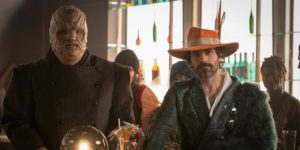 And, finally, we get to the fifth episode of the show and I’m struggling with how to explain my thoughts on it. Tonally the episode is a mess; it begins and ends with two of the darkest deaths in the franchise and then for 30 minutes in the middle it’s a goofy prisoner exchange scam with everyone playing dress-up. I can’t decide if it was stupidly brilliant or brilliantly stupid. The writers made a lot of choices they probably shouldn’t have made this episode – I thought an awful lot of this episode was straight-up bad – but part of me is glad they did because it was such an enjoyably bonkers and bizarre episode. I don’t know what to think of it. It’s all over the place in a manic way I kind of love but I also accept it’s just not good. A lot of it was simply rubbish. But I have to admit, it’s fun. There are some genuinely good moments in there, they’re just disguised under a gregarious pimp outfit and an eye patch. I enjoy silly Star Trek and silliness should always have a place in this franchise that too many take too seriously, but while I had fun, it didn’t really work this time. Even though it dealt with the rescue of Maddox, the majority of the episode ultimately felt unnecessary and more of a backdoor ‘Seven of Nine: Fenris Ranger’ pilot than an episode of Picard.
And, finally, we get to the fifth episode of the show and I’m struggling with how to explain my thoughts on it. Tonally the episode is a mess; it begins and ends with two of the darkest deaths in the franchise and then for 30 minutes in the middle it’s a goofy prisoner exchange scam with everyone playing dress-up. I can’t decide if it was stupidly brilliant or brilliantly stupid. The writers made a lot of choices they probably shouldn’t have made this episode – I thought an awful lot of this episode was straight-up bad – but part of me is glad they did because it was such an enjoyably bonkers and bizarre episode. I don’t know what to think of it. It’s all over the place in a manic way I kind of love but I also accept it’s just not good. A lot of it was simply rubbish. But I have to admit, it’s fun. There are some genuinely good moments in there, they’re just disguised under a gregarious pimp outfit and an eye patch. I enjoy silly Star Trek and silliness should always have a place in this franchise that too many take too seriously, but while I had fun, it didn’t really work this time. Even though it dealt with the rescue of Maddox, the majority of the episode ultimately felt unnecessary and more of a backdoor ‘Seven of Nine: Fenris Ranger’ pilot than an episode of Picard.
It’s in this episode that we’re properly reintroduced to Voyager’s Seven of Nine and while plenty of time has passed since her last appearance, it doesn’t feel like the same character to me. She loses Icheb in disastrous circumstances, albeit poorly executed circumstances because I didn’t get the sense he needed to be put out of his misery. Sure, he lost an eye but this is Star Trek. People come back from stuff like that. His death sets up that she seeks and enacts bloody revenge because she accepts her former Borg status and lack of humanity, but this perceived lack of humanity in the past had nothing to do with being some cold-hearted killer. Granted, she hadn’t lost someone like Icheb before, but her journey used to be about struggling to understand individualism and her failure to connect with her crew mates. It was a difference she would accept but also seek to improve, seen my many, including myself, almost as a parallel for autism. Not psychopathy. Her humanity and a relationship with another person, her driving goal in Voyager, led to her revealing information about Icheb and therefore his death, so she wants to close off her humanity, retreat from being Annika and become Seven again. But this doesn’t really work because she’s still more human than we’ve ever seen her be before because of the 20-year time gap between Voyager and Picard. I could see my opinion on this changing if I accept this new update of Seven, especially as we see more of her, but now, mere days after watching the episode, it’s not gelling for me.
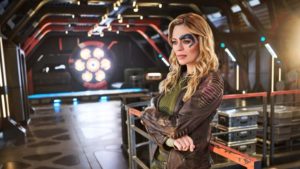 ‘Stardust City Rag’ is very much Seven’s episode and Picard is left with little to do. Yet not only is there a way to bring the titular character into the plot but there’s also a way to have the episode tie into the themes and main narrative of the season that I’m shocked they didn’t do. Undoubtedly the best scene of the episode is Picard and Seven all too briefly discussing that they both used to be Borg and they still don’t feel like they’ve fully regained their humanity after their assimilation. It’s a wonderful moment but it lasts only for about 30 seconds. This is what connects and defines both characters and so why wasn’t the plot built around this rather than some unnecessary criminal dealings in a futuristic nightclub? It’s a truly bizarre decision. The discussion should have been the impetus of the story, not just some 30-second chat at the end of an unrelated mission. The antagonist Bjayzl’s whole deal is that she brutalises former Borg drones and extracts their implants which is the motive for Seven but Picard never comments on it. They should both be seeking to shut down her operation, exploring their past as Borg themselves and how that connects them rather than playing dress-up in a generic criminal deal that then falls apart. And the whole heist-like plot is terrible as it stands. Seven just grabs Bjayzl by the throat and the bodyguards back off? And even when she lets go Seven is still somehow in control of the situation once Rios kills Mr Vup. The situation is anything but tense. It’s just a bunch of people standing around explaining the plot to each other.
‘Stardust City Rag’ is very much Seven’s episode and Picard is left with little to do. Yet not only is there a way to bring the titular character into the plot but there’s also a way to have the episode tie into the themes and main narrative of the season that I’m shocked they didn’t do. Undoubtedly the best scene of the episode is Picard and Seven all too briefly discussing that they both used to be Borg and they still don’t feel like they’ve fully regained their humanity after their assimilation. It’s a wonderful moment but it lasts only for about 30 seconds. This is what connects and defines both characters and so why wasn’t the plot built around this rather than some unnecessary criminal dealings in a futuristic nightclub? It’s a truly bizarre decision. The discussion should have been the impetus of the story, not just some 30-second chat at the end of an unrelated mission. The antagonist Bjayzl’s whole deal is that she brutalises former Borg drones and extracts their implants which is the motive for Seven but Picard never comments on it. They should both be seeking to shut down her operation, exploring their past as Borg themselves and how that connects them rather than playing dress-up in a generic criminal deal that then falls apart. And the whole heist-like plot is terrible as it stands. Seven just grabs Bjayzl by the throat and the bodyguards back off? And even when she lets go Seven is still somehow in control of the situation once Rios kills Mr Vup. The situation is anything but tense. It’s just a bunch of people standing around explaining the plot to each other.
So, where do we go now? The quest of the first half of the season was to find Maddox and now full attention has been turned to Soji after the former’s death. You know, rewatching ‘The Measure of a Man’ is going to be weird now considering the next time we see Maddox after that serious and pretentious courtroom episode is the weirdest comedic prisoner exchange ever. Picard is heading for the Artifact and no doubt the dreaded truth will out, maybe along with some reanimated Borg. I’m excited for the second half of the show but the fifth episode did temper my excitement somewhat. Despite that fun but quite terrible instalment, I’m still much more positive than negative on the series as a whole. I liked ‘Absolute Candor’ much more than I disliked ‘Stardust City Rag’.
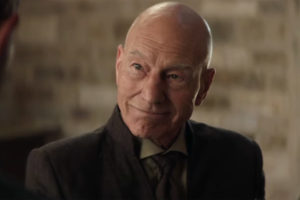 I may sound more negative than I actually am about the show but it does have some problems. I’ve found that the series gets dramatically weaker the more the focus is taken away from Picard, to unneeded conspiracies and unnecessary side characters. He truly is the heart of the show and when Stewart is onscreen the series works well. So, it’s a good thing the series is named after him. It’s often messy but (almost) always entertaining. I’m enjoying Star Trek: Picard, warts and all.
I may sound more negative than I actually am about the show but it does have some problems. I’ve found that the series gets dramatically weaker the more the focus is taken away from Picard, to unneeded conspiracies and unnecessary side characters. He truly is the heart of the show and when Stewart is onscreen the series works well. So, it’s a good thing the series is named after him. It’s often messy but (almost) always entertaining. I’m enjoying Star Trek: Picard, warts and all.
The show has been dividing opinions across the Star Trek fanbase and I’m eager to know your thoughts on Star Trek: Picard. Leave them in the comments and be sure to geek out with me about TV, movies and video-games on Twitter @kylebrrtt.





